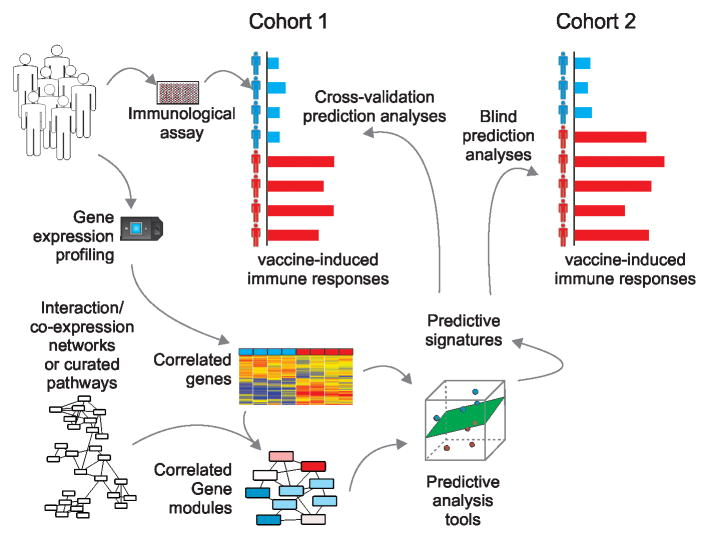Systems vaccinology: Enabling rational vaccine design with systems biological approaches.
Vaccines have drastically reduced the mortality and morbidity of many diseases. However, vaccines have historically been developed empirically, and recent development of vaccines against current pandemics such as HIV and malaria has been met with difficulty. The advent of high-throughput technologies, coupled with systems biological methods of data analysis, has enabled researchers to interrogate the entire complement of a variety of molecular components within cells, and characterize the myriad interactions among them in order to model and understand the behavior of the system as a whole. In the context of vaccinology, these tools permit exploration of the molecular mechanisms by which vaccines induce protective immune responses. Here we review the recent advances, challenges, and potential of systems biological approaches in vaccinology. If the challenges facing this developing field can be overcome, systems vaccinology promises to empower the identification of early predictive signatures of vaccine response, as well as novel and robust correlates of protection from infection. Such discoveries, along with the improved understanding of immune responses to vaccination they impart, will play an instrumental role in development of the next generation of rationally designed vaccines.
Authors
Thomas Hagan; Helder I Nakaya; Shankar Subramaniam; Bali Pulendran
External link
Publication Year
Publication Journal
Associeted Project
Systems Vaccinology
Lista de serviços
-
As antisense RNA gets intronic.As antisense RNA gets intronic.
-
Androgen responsive intronic non-coding RNAs.Androgen responsive intronic non-coding RNAs.
-
Conserved tissue expression signatures of intronic noncoding RNAs transcribed from human and mouse loci.Conserved tissue expression signatures of intronic noncoding RNAs transcribed from human and mouse loci.
-
The intronic long noncoding RNA ANRASSF1 recruits PRC2 to the RASSF1A promoter, reducing the expression of RASSF1A and increasing cell proliferation.The intronic long noncoding RNA ANRASSF1 recruits PRC2 to the RASSF1A promoter, reducing the expression of RASSF1A and increasing cell proliferation.
-
Antisense intronic non-coding RNA levels correlate to the degree of tumor differentiation in prostate cancer.Antisense intronic non-coding RNA levels correlate to the degree of tumor differentiation in prostate cancer.
-
Insight Into the Long Noncoding RNA and mRNA Coexpression Profile in the Human Blood Transcriptome Upon Leishmania infantum Infection.Insight Into the Long Noncoding RNA and mRNA Coexpression Profile in the Human Blood Transcriptome Upon Leishmania infantum Infection.
-
Long non-coding RNAs associated with infection and vaccine-induced immunityLong non-coding RNAs associated with infection and vaccine-induced immunity
-
Comparative transcriptomic analysis of long noncoding RNAs in Leishmania-infected human macrophagesComparative transcriptomic analysis of long noncoding RNAs in Leishmania-infected human macrophages
-
SARS-CoV-2 Selectively Induces the Expression of Unproductive Splicing Isoforms of Interferon, Class I MHC, and Splicing Machinery Genes.SARS-CoV-2 Selectively Induces the Expression of Unproductive Splicing Isoforms of Interferon, Class I MHC, and Splicing Machinery Genes.

